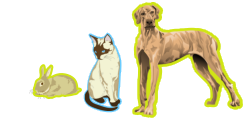Dental Procedures & Treatment Advice from New Lodge Vets


Cats and Dogs
Dental procedures are carried out under a full general anaesthetic. With an endotracheal tube placed in the windpipe and a throat pack to stop bacterial loaded water from the mouth and debris entering your pet’s lungs. A dental scale and polish involves the removal of hard stony tartar and soft plaque from the visible parts of the teeth and the important unseen area below the gum line. Ultrasonic tips are used to clean this area, vibrating at 25,000 times per second. An individual chart is compiled of your pet’s mouth recording dentition and soft tissues just like human dentists do.
Treatments performed include Ultrasonic Scaling and polishing, Periodontal Surgery, and extractions (teeth).
Finally after examination and any necessary treatments/extractions, each tooth is polished smooth with a dental polisher and special paste. This helps to prevent the rapid re-attachment of plaque. Plaque is the main enemy of good dental health. It is formed from food debris, bacteria and salivary proteins. The equivalent of a tip of a teaspoon of plaque may contain an average of 200,000 bacteria. Ideally the physical removal of plaque on a daily basis is essential to stop dental disease restarting at the same rate as before.
Depending on the level of dental disease, it may be necessary to extract damaged or loose teeth. Dissolvable sutures may be used to close the gum edges – these will not require removal. Antibiotics and pain relief may be prescribed. Post-operative diet is usually provided and then softened food is required for the next 2-3 days with no hard chews or bones for 2-3 weeks.
In order to check your pet’s healing we will usually ask you to make an appointment to revisit the surgery with your pet a few days after the dental procedure. This will also give you the opportunity to discuss any questions you may have, whilst allowing our trained staff to discuss suitable diets and or home care routine for you and your pet to keep your pet’s teeth as healthy as possible. There is no extra charge for this service.
Rabbits
Rabbits require a tough, fibrous diet in order to wear down their continually growing teeth. Dry rabbit pellets and plenty of hay should be provided. Free access to growing grass and provision of other fresh vegetables in moderation is recommended. Avoid sweet fruit and large quantities of cabbage and other brassicas. Rabbits enjoy stripping the bark off pieces of non-toxic wood (e.g. apple twigs). This helps to keep the incisor teeth short and sharp.
Weight loss, inappetance, excessive salivation, lumps around the face and discharge from the nose or eyes may all be signs of dental disease. Check your rabbit’s front teeth weekly. If they seem longer than usual, or there are any other abnormalities, please make an appointment for a vet to check your rabbit’s mouth.
Dental procedures are carried out under a full general anaesthetic. Your rabbit may be sleepy and a bit unsteady for the next 12-24 hours and should be placed in a warm, dry bed free from draughts. Plenty of good quality hay should be provided which allows your rabbit to insulate itself and also provides an immediate source of food. Your rabbit should be encouraged to eat and drink as soon as possible after coming home.
Treatments performed under general anaesthetic include Cheek Tooth Trimming, Occlusal Equilibration and incisor extractions.
